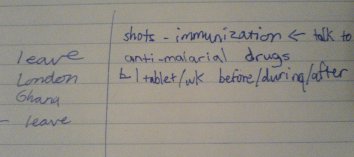Post-Colonial Stability 17 years, 1 month ago by Martey Dodoo

Two days ago, on March 6, was the fiftieth anniversary of Ghana's independence from Great Britain. If you want insightful commentary on the event, head over to Ethan Zuckerman's post. This lack of anything useful to say is partly because when I think of Independence Day, I think of July 4 as opposed to March 6, and partly because I was trying to deal with more concrete concerns (see image at right).
Most of the time when I mention that my parents are from Ghana, the person I am talking immediately wonders "what language they speak there." I get a kick out of replying "English," even when it is clear that they were wondering about the regional languages spoken there.
Of course, like many former colonies, the reason that the official language of Ghana is English is because it was formerly a British colony. Besides making it significantly easier for my parents to integrate into American society, it may have had substantial salutary effects on the stability of Ghana. A recent New York Times article on another of Zuckerman's favorite topics, Somalia, gives a reason for why the northern region of Somaliland is so stable despite the rest of Somalia residing in various levels of anarchy:
When the colonial powers sliced up the Horn of Africa in the 19th century, the British got Somaliland and the Italians got Somalia. While the British relied mostly on clan chiefs to govern, the Italians created an entire Italian-speaking administration and imported thousands of people from Italy to farm bananas, build cathedrals and teach the people how to pour espresso.One result was that Mogadishu, along the southern coast, became a major commercial hub and one of the most beautiful cities in Africa, but its traditional systems of authority were weakened. That is partly why, many Somalia analysts say, warlords were able to outmuscle clan elders and dominate Mogadishu in the vacuum that formed after the central government fell.
The British, on the other hand, never invested much in Somaliland, leaving it poor and dusty but with its traditions more or less intact. The two territories were granted independence in 1960 and quickly merged to form the Somali Republic, but it was never a happy marriage. By the 1980s, the Somali National Movement, a northern rebel group, was blowing up government posts.
Incidentally, Somaliland's motto is "Justice, Peace, Freedom, Democracy and Success for All," which is remarkably similar to Ghana's motto of "Freedom and Justice" (contrasted with mottos like those of the Central African Republic, which is "Unity, Dignity, Work"). Regardless, I do not think that the fact that the majority of British colonies in Africa have been free of ethnic tension excuses them from their imperialistic actions in the past, even if their system of boarding schools are the reason why.